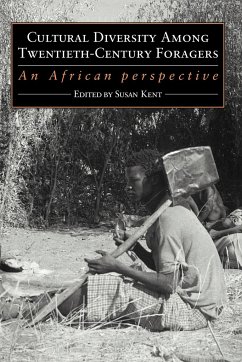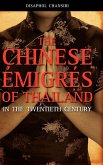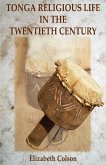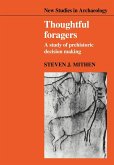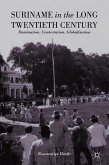This book examines variability within broadly defined African forager societies.
This book examines variability within broadly defined African forager societies, such as the Basarwa, Pygmies, Hadza and others. Foragers have been seen as culturally similar in that they all pursue a subsistence strategy that emphasizes hunting and gathering. However, research suggests there may be more diversity among groups than has previously been acknowledged. It is important to understand why diversity occurs within foraging societies and how this diversity compares with various societies. Here, leading scholars in the field compare and contrast various groups within more broadly defined forager societies. The chapters, which range in orientation from symbolic to ecological and behavioural, are based on rich ethnographic detail and the volume provides invaluable data on hunter-gatherer life that will interest anyone concerned with past or present foragers.
Review quote:
"...this volume is invaluable to social scientists as well as development practitioners."
Choice
"As befits an editor of her considerable experience, Kent has done a solid job of integrating these diverse solicited pieces."
Robert J. Gordon, African-American Studies
Table of contents:
List of illustrations; List of contributors; 1. Cultural diversity among African foragers: causes and implications Susan Kent; Part I. Southern African Foragers: 2. Neither are your ways my ways George Silberbauer; 3. Diversity and flexibility: the case of the Bushmen of Southern Africa Mathias Guenther; 4. Nharo and Hai//om settlement patterns in comparative perspective Alan Barnard and Thomas Widlok; 5. Kua: farmer/foragers of the eastern Kalahari, Botswana Helga Vierich and Robert Hitchcock; 6. Hunting variability at a recently sedentary Kalahari village Susan Kent; Part II. Eastern African Foragers: 7. The global process and local ecology: how should we explain differences between the Hadza and the !Kung? Nicholas Blurton Jones, Kristen Hawkes and James O'Connell; 8. Fission, fusion, and foragers in East Africa: micro- and macroprocesses of diversity and integration among Okiek groups Roderic Blackburn; Part III. Central African Foragers: 9. Cultural diversity among African pygmies Barry Hewlett; 10. A comparative approach to hunting rituals among Baka Pygmies (southeastern Cameroon) Daou V. Joiris; 11. Cultural diversity in the use of plants by the Mbuti hunter-gatherers in northeastern Zaire: an ethnobotanical approach Mitsuo Ichikawa and Hideaki Terashima; Part IV. Commentary: 12. Hunter-gatherer research and cultural diversity Nurit Bird-David; References; Index.
Hinweis: Dieser Artikel kann nur an eine deutsche Lieferadresse ausgeliefert werden.
This book examines variability within broadly defined African forager societies, such as the Basarwa, Pygmies, Hadza and others. Foragers have been seen as culturally similar in that they all pursue a subsistence strategy that emphasizes hunting and gathering. However, research suggests there may be more diversity among groups than has previously been acknowledged. It is important to understand why diversity occurs within foraging societies and how this diversity compares with various societies. Here, leading scholars in the field compare and contrast various groups within more broadly defined forager societies. The chapters, which range in orientation from symbolic to ecological and behavioural, are based on rich ethnographic detail and the volume provides invaluable data on hunter-gatherer life that will interest anyone concerned with past or present foragers.
Review quote:
"...this volume is invaluable to social scientists as well as development practitioners."
Choice
"As befits an editor of her considerable experience, Kent has done a solid job of integrating these diverse solicited pieces."
Robert J. Gordon, African-American Studies
Table of contents:
List of illustrations; List of contributors; 1. Cultural diversity among African foragers: causes and implications Susan Kent; Part I. Southern African Foragers: 2. Neither are your ways my ways George Silberbauer; 3. Diversity and flexibility: the case of the Bushmen of Southern Africa Mathias Guenther; 4. Nharo and Hai//om settlement patterns in comparative perspective Alan Barnard and Thomas Widlok; 5. Kua: farmer/foragers of the eastern Kalahari, Botswana Helga Vierich and Robert Hitchcock; 6. Hunting variability at a recently sedentary Kalahari village Susan Kent; Part II. Eastern African Foragers: 7. The global process and local ecology: how should we explain differences between the Hadza and the !Kung? Nicholas Blurton Jones, Kristen Hawkes and James O'Connell; 8. Fission, fusion, and foragers in East Africa: micro- and macroprocesses of diversity and integration among Okiek groups Roderic Blackburn; Part III. Central African Foragers: 9. Cultural diversity among African pygmies Barry Hewlett; 10. A comparative approach to hunting rituals among Baka Pygmies (southeastern Cameroon) Daou V. Joiris; 11. Cultural diversity in the use of plants by the Mbuti hunter-gatherers in northeastern Zaire: an ethnobotanical approach Mitsuo Ichikawa and Hideaki Terashima; Part IV. Commentary: 12. Hunter-gatherer research and cultural diversity Nurit Bird-David; References; Index.
Hinweis: Dieser Artikel kann nur an eine deutsche Lieferadresse ausgeliefert werden.

